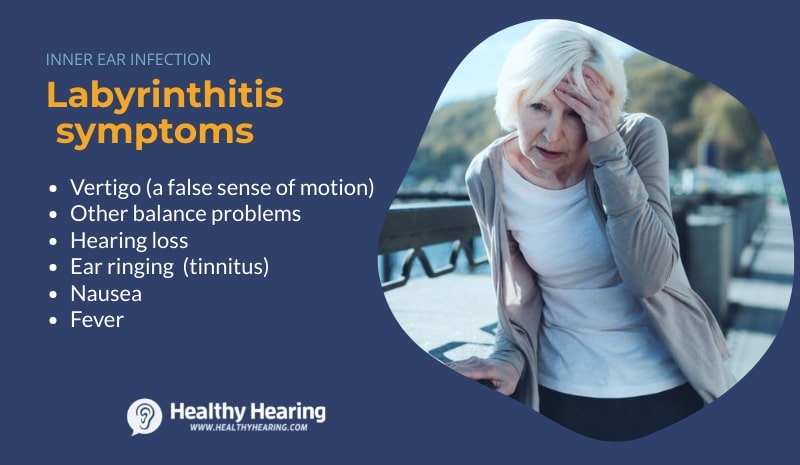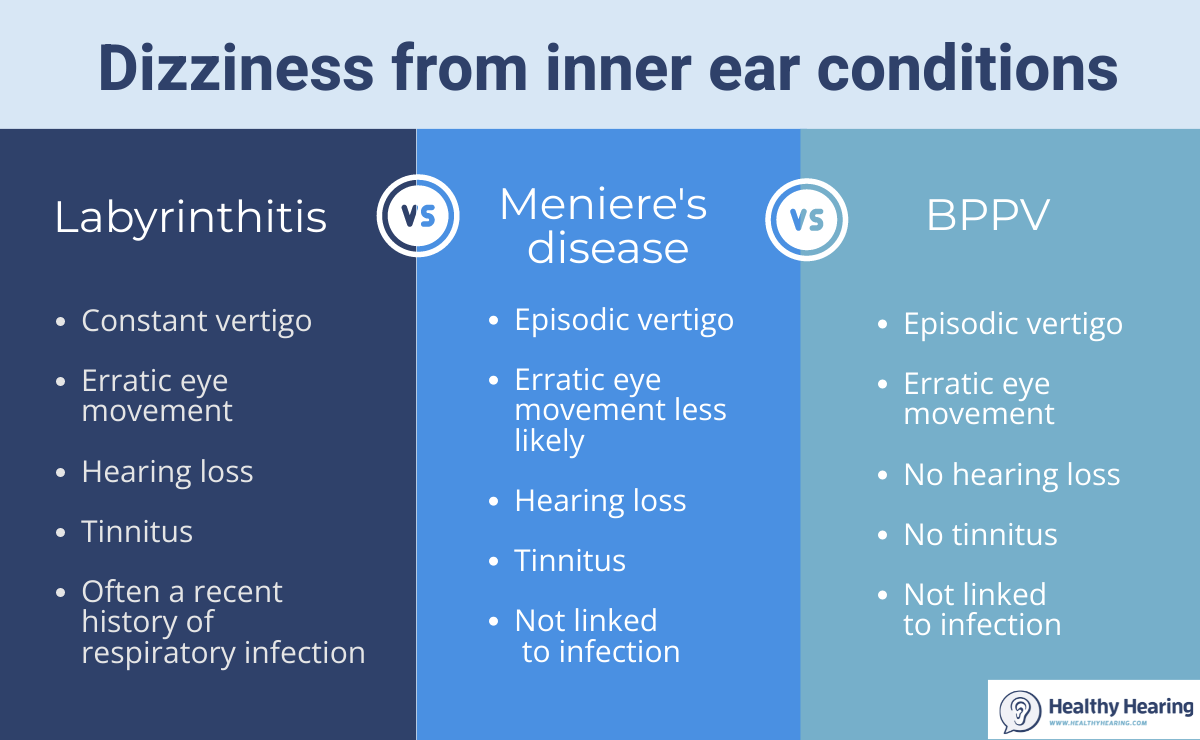Key points:
-
Labyrinthitis is an infection of the inner ear that causes inflammation of the balance and hearing organs.
-
It can cause intense dizziness, vertigo, hearing loss, fever, and nausea, among other symptoms.
-
Prompt treatment reduces chances of permanent problems.
Imagine waking up one morning and the room won’t stop spinning—like you’re stuck on a merry-go-round you never agreed to ride. That sudden disorienting sensation could be more than just a dizzy spell; it might be labyrinthitis. This condition gets its name from the "labyrinth" of complex balance and hearing organs in the inner ear.
This inner ear condition often sneaks in after a cold or viral infection, causing vertigo, dizziness, and even hearing issues.
A tricky diagnosis
Because its symptoms mimic other ear disorders, such as Meniere’s disease, diagnosing labyrinthitis can be tricky.
“Diagnosing labyrinthitis is often a process of elimination,” says Dr. Sarah Lundstrom, a board-certified audiologist with HearCare Audiology Center in Sarasota, FL. “Prompt treatment is very important. The longer it takes to get treatment, the less likelihood you have of recovering your hearing.”
More: Is your dizziness from labyrinthitis, BPPV or Meniere's? How to know

Symptoms of labyrinthitis
The key symptoms of labyrinthitis include:
- sudden intense dizziness or vertigo (a false sense of motion)
- balance problems
- erratic eye movements
- hearing loss or ringing in the ears
- nausea
- fever
Even if symptoms ease on their own, getting evaluated by a doctor is important, especially if symptoms return or worsen. Lundstrom says early diagnosis and treatment can help prevent long-term hearing or balance issues.
Causes of labyrinthitis
Labyrinthitis is inflammation of the labyrinth, a part of your inner ear that helps control balance and hearing. While more research is needed, it seems to increase in prevalence with age, note authors of the medical textbook StatPearls.
Also, “people with autoimmune disorders or weakened immune systems are at higher risk,” says Dr. Lundstrom. “Labyrinthitis often follows a respiratory or sinus infection, where a virus or bacteria can easily spread to the inner ear.”
Symptoms can range from mild to severe and often come on suddenly without warning.
Getting treated
Generally, an internal medicine doctor or ear-nose-throat physician will perform the initial exam, and an audiologist will conduct tests to see how balance and hearing are affected.
In addition to a physical exam, a doctor will screen for risk factors of labyrinthitis, like recent bacterial or viral infections, autoimmune disorders, recent ear trauma or surgery, allergies, stress, and certain medications. Sometimes, a doctor will order an MRI to rule out stroke.

Prompt treatment is critical
Lundstrom emphasizes that getting treated for labyrinthitis as soon as possible is crucial to reduce the severity and duration of symptoms. It also lowers the risk of complications, such as chronic dizziness or permanent hearing loss.
“Your physician may prescribe medication to help fight the virus or bacteria,” she says.
Medications used to treat labyrinthitis include antivirals, antibiotics, corticosteroids, and drugs to manage nausea and dizziness.
Initial vertigo rarely lasts longer than 72 hours with labyrinthitis, however, balance issues and brief episodes of vertigo may persist for several weeks.
Coping techniques
At first, labyrinthitis may require bedrest, notes Rachel Raphael, MA, CCC-A, an audiologist with ENT Baltimore and Mercy Medical Center.
As recovery progresses, she encourages people to start moving and to do vestibular rehabilitative exercises with a physical therapist or at home. These exercises can help people return to normal activities.
“We also recommend reducing the use of caffeine, alcohol, nicotine, salty products, sodas and other beverages/ products high in sugar, as well as managing stress and fatigue,” Raphael says. Staying hydrated is also important.
You may also want to limit exposure to bright lights, loud noises, and crowded environments during your recovery. If you’re feeling dizzy, limit reading and screen time, since these activities can worsen vertigo. Avoid driving until you feel recovered.
Since labyrinthitis can also cause anxiety, it's also helpful to try relaxation techniques like mindfulness and meditation.
Long-term outlook
The long-term outlook for labyrinthitis is generally positive, especially with prompt diagnosis and treatment. Most people see their acute symptoms, like vertigo, resolve in a couple of days, although milder symptoms may last for several weeks, doctors note. The exact recovery timeline can vary depending on the cause and severity of the inflammation.
What about hearing loss?
Hearing loss is a common symptom. But it’s not always permanent, Lundstrom says, noting many people will have normal hearing after the infection is over.
In rare cases, the eighth cranial nerve can be permanently damaged, leading to partial or complete hearing loss, which might require a hearing aid.
While labyrinthitis can be a frightening experience, the good news is most people make a full recovery with rest, medication, and support.




